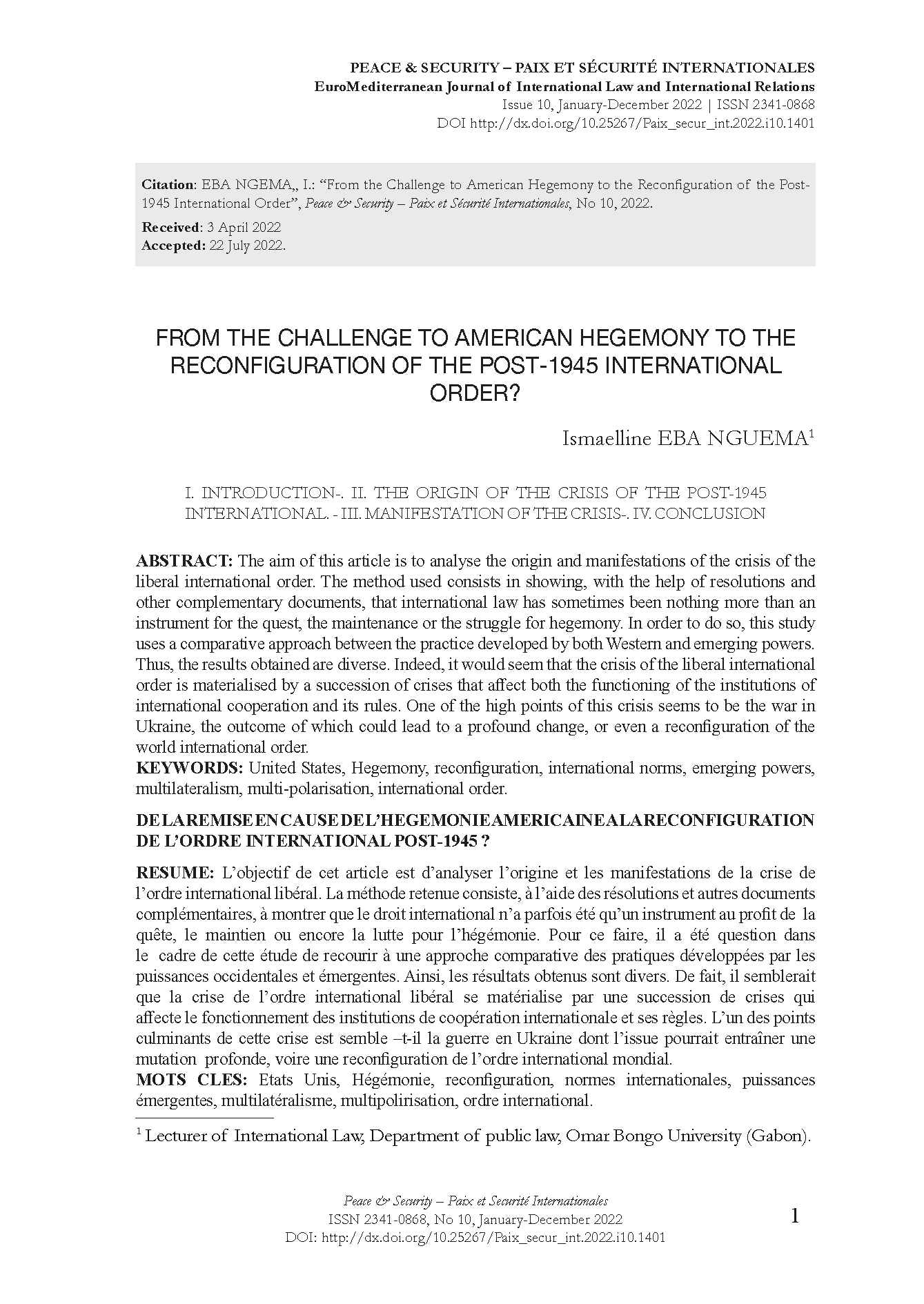From the Challenge to American Hegemony to the Reconfiguration of the Post-1945 International Order
Résumé
DE LA REMISE EN CAUSE DE L’HEGEMONIE AMERICAINE A LA RECONFIGURATION DE L’ORDRE INTERNATIONAL POST-1945 ?
L’objectif de cet article est d’analyser l’origine et les manifestations de la crise de l’ordre international libéral. La méthode retenue consiste, à l’aide des résolutions et autres documents complémentaires, à montrer que le droit international n’a parfois été qu’un instrument au profit de la quête, le maintien ou encore la lutte pour l’hégémonie. Pour ce faire, il a été question dans le cadre de cette étude de recourir à une approche comparative des pratiques développées par les puissances occidentales et émergentes. Ainsi, les résultats obtenus sont divers. De fait, il semblerait que la crise de l’ordre international libéral se matérialise par une succession de crises qui affecte le fonctionnement des institutions de coopération internationale et ses règles. L’un des points culminants de cette crise est semble –t-il la guerre en Ukraine dont l’issue pourrait entraîner une mutation profonde, voire une reconfiguration de l’ordre international mondial.
Mots-clés
Téléchargements
Comment citer
Licence

Cette œuvre est sous licence Creative Commons Attribution - Pas d'Utilisation Commerciale 4.0 International.
Copyright
Es condición para la publicación que el autor o autores ceda(n) a la Revista, en exclusiva, los derechos de reproducción. Paix et Sécurité Internationales es una revista que proporciona un acceso abierto inmediato a su contenido totalmente gratuito para lectores como para los investigadores que pretendan publicar en ella, ya que no se realizan cobros por concepto de envío, procesamiento ni publicación. Los usuarios podrán leer, descargar, copiar, distribuir, imprimir, buscar o enlazar el texto completo de los artículos publicados, o utilizarlos para cualquier otro propósito, dentro de la legalidad vigente. Y podrán hacerlo sin coste alguno, y sin necesitad de solicitar permiso al editor a al autor. Todo ello de acuerdo con la definición de acceso abierto de la Iniciativa Acceso Abierto de Budapest.
Références
BIRDSALL, N; DE LA TORRE, A; VALENCIA CAICEDO, F. The Washington consensus: assessing a damage brand, World Bank and Center for Global Development, 2010.
CARREAU, D., et al, Droit international économique, Dalloz, 6ème édition, 2017, pp.62-156.
CHOUKROUNE, L. “China and the WTO settlement system: the global trade lawyer and the state capitalist”, China perspectives, n°1, 2012, pp.49-57.
COT, J-P., PELLET, A. FORTEAU, M. Charter of the United Nations, 3ème Economica edition, 2005, pp.401-404.
DAGI, D. “The Russian stand on the responsibility to protect: does Strategic culture matter?” Journal of Asian Security and International Affairs, vol 7, Issue 3, 2020, pp. 370-386.
DAWDA, S. “To what extent does international law reflect the sovereign will of states?”, E-International Relations, 2016.
DUNCOMBE, C., DUNNE, T. “After internationalism”, International Affairs, vol 94, no I (2018), p.30.
EBA NGUEMA, I. Securité alimentaire et libéralisation commerciale, Thèse de doctorat, Université Mohammed V Rabat, 2018, p.170, 229, 247.
FERLET, P., SARTRE, P. “La cour pénale internationale à la lumière des positions américaines et françaises”, vol 2, Tome 406, Etudes, 2007, p.171.
GORE, C. “The Rise and fall of the Washington consensus as a paradigm for developing countries”, World Developement, vol 28, Issue 5, 2000, pp.784-804.
GÖTZ, E., AND MERLEN, C-R. “Russia and the question of world order”, European Politics and Society, vol 20, n°2, 2020, pp.133-153.
IKENBERRY, J. “The end of the liberal order?”, International Affairs, Vol 94, n°1, 2018, pp.7-23.
IKENBERRY, J. “Liberal internationalism 3.0: America and dilemmas of liberal world order”, Perspectives on politics, Vol 7, n°1, 2009, pp.73-79.
ISAKHAN, B. “Introduction The Iraq Legacies Intervention, Occupation, Withdrawal and Beyond”, In B. Isakhan (Ed.), The Legacy of Iraq: From the 2003 War to the ‘Islamic State, Edinburgh University Press, 2015, pp.1-18.
MEARSHEIMER, J. “Bound to Fail: The Rise and Fall of the Liberal International Order”, International Security, Vol. 43, No. 4, 2019, pp. 7-50.
MENDES, F., BALBUENA HUGO RUIZ, D. “La dégradation généralisée du respect au droit international”, Revue internationale et stratégique, vol 4, N°60, 2005, pp.47-48.
MOYER, W., JOSLING, T. “Reform revived: Dunkel draft, the Blair House Accord and the WTO agreement on agriculture”, chapter 7 in Agricultural Policy Reform, 2002, Routledge, pp. 1-26.
PAPASOTIRIOU, H. “Kosovar insurrection, Serbian retribution and NATO intervention”, Journal of Strategic Studies, vol 25, Issue 1, 2002, pp.39-62.
RUBINI, L. The never-ending story: The puzzle of subsidies, in Trade War The Clash of Economic Systems Endangering Global Prosperity (ed. Meredith A. Crowley), CEPR Press, 2019, pp. 103-109.
TAVERNIER, Y. “Critiques les institutions financières internationales”, Economie politiques, vol 2, n°10, 2001, pp.18-43.
WILLIAMSON, J. “Un train de réformes Consensus de Washington : un bref historique et quelques suggestions”, Finances & Développement, 2003, pp.10-13.
WU, M. China’s rise and the growing doubts over trade multilateralism, Trade War The Clash of Economic Systems Endangering Global Prosperity (ed. Meredith A. Crowley), CEPR Press, 2019, pp.84-92.







